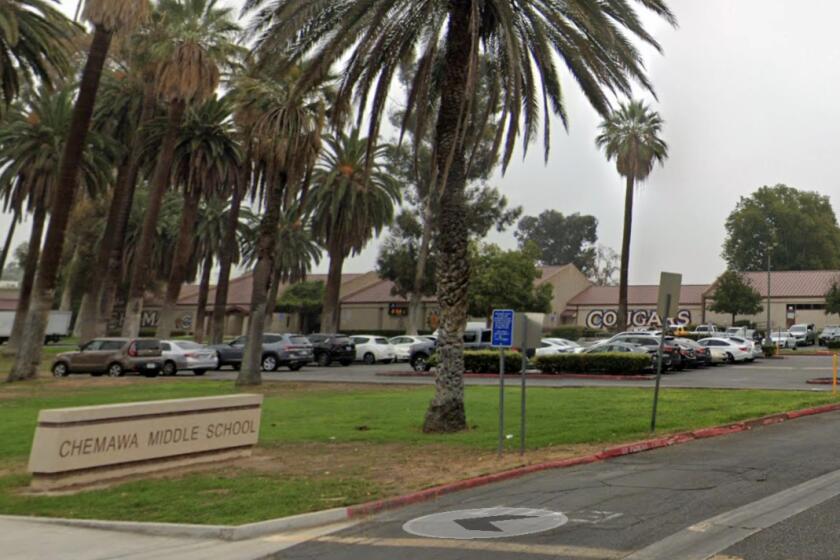Students’ options changing by degrees
Laura Simurda faced a tough decision recently in choosing which of three simultaneous graduation ceremonies to attend at USC. After all, she was a triple major, earning degrees in astronomy, history and print journalism. Simurda finally chose to be among her astronomy classmates but doesn’t want to be pigeonholed, because she found both science and the humanities stimulating. “It always seemed to keep my brain running in both fields,” she said.
Such eclectic academic tastes are increasingly evident this college graduation season as students seek extra credentials to help them compete in a tightening job market. U.S. Department of Education statistics show an 85% rise in the number of bachelor’s degrees with double -- and the relatively rare triple -- majors over the last decade.
Some experts say the trend reflects a more complicated world that needs broad thinkers to solve society’s problems.
But some describe it as another step in resume-building that has obsessed some young people since their high school honors courses.
Students think the double majors will distinguish them from the mob and appeal to graduate schools and potential employers. Remember Woody Allen’s quip about bisexuality doubling your chances for a Saturday night date?
Clifford Adelman, a senior associate at the Institute for Higher Education Policy, a think tank based in Washington, D.C., said he sees more double majors but is not sure they help students in life other than allowing them to demonstrate ambition.
“These are signaling devices. And there is nothing wrong with signaling achievements,” he said, adding that the increase also reflects colleges’ marketing of the double-major option.
“We do see a trend,” said Cheryl Beil, assistant vice president of academic planning at George Washington University in Washington, D.C., where about 16% of students tackle double majors.
“They are doing double majors to make sure they have all the skills they need to make themselves employable,” Beil said. However, she said she questions whether it impresses employers as much as overall grades and abilities do.
Not surprisingly, plenty of double majors link allied topics, such as philosophy and political science. Others are less tidy packages, such as a recent art history and economics pairing at UCLA and dance and environmental science at Wesleyan University in Connecticut.
At Pomona College, Darby Walters graduated recently in molecular biology and English literature.
Walters, an Oregon resident, said she met the requirements of 16 semester courses for molecular biology and 11 for English because “being able to define yourself in several different ways is definitely a positive thing.”
At Pomona, about 10% of seniors have double majors.
While juggling Chaucer and DNA strands was stressful at times, Walters said she had no regrets. She plans to do volunteer health work in New Zealand and then decide between medical school or a graduate program in English. Or possibly do both, at different times.
“The great thing about our generation is that we don’t feel we are limited to have one profession in life,” Walters said. “We feel we can change and start over.”
Jack Waldron, who earned dual degrees in history and cinema critical studies at USC, often felt ties between his two majors even if others didn’t. For example, an international cinema class delved into German Expressionist movies of the 1920s after he studied Germany between the world wars.
“I already knew the stuff that was going on in the country that was affecting their cinema. So it was easy to relate the cinema to national identity,” said Waldron, who hopes to work in the film industry.
In general, double majors require students to devote a half to two-thirds of their courses to the two subjects.
The popularity of double majors varies widely, in part because of different policies.
Some schools have rigid requirements that make it difficult, but more lenient schools allow some classes to count in both majors.
The topic gets complicated because some colleges advocate academic minors instead, a less onerous undertaking involving fewer courses than a second major.
At USC, about 9% of graduates earn a double major or more, compared to about 4% a decade ago. Other schools showing significant increases in double majors include UC San Diego, Wesleyan University and the University of Washington in Seattle. (UCLA allows double majors but has seen a large increase in students taking minors, which was not permitted before 1995.)
Educators debate the wisdom of double majors.
Eric Frank, Occidental College’s dean and vice president for academic affairs, said students are free to choose them, but he isn’t enthusiastic about it.
At Occidental, where about 9% of students earn double majors, students must write a major research paper or create a special project in each discipline. “Our experience generally has been that if a student chooses to do two majors, the deep quality of work is threatened because it has to be spread too thinly over two subjects,” Frank said.
Also, he said, a broad education can be sabotaged by a double major, which would leave little room for exploration of other subjects.
Too often, he said, double majors are “taking the kind of high school notion of competition and applying it in college and then to their professional life. And it’s not the same.”
In contrast, USC strongly encourages double majoring, even if students need an extra semester to meet requirements.
“We think it’s a wise thing to take the undergraduate years to explore if you have multiple interests,” said Nelson Bickers, USC’s vice provost for undergraduate programs. “You never know in the future which direction your career is going to lead.”
In 2000, USC President Steven B. Sample established the Renaissance Prize to honor high grades in two or more widely separated fields, either a double major or major-minor combination.
Ten graduating seniors a year are awarded $10,000 each for further studies.
Among them is Simurda, a Lake Forest resident who took a fifth year to get her three majors, including a semester in Scotland, where she studied medieval history.
Simurda will use her prize money to help pay for a complicated graduate program ahead: dual master’s degrees at USC in aerospace engineering and science journalism, with a possible career as an engineer who writes about science on the side.
--
More to Read
Sign up for Essential California
The most important California stories and recommendations in your inbox every morning.
You may occasionally receive promotional content from the Los Angeles Times.











